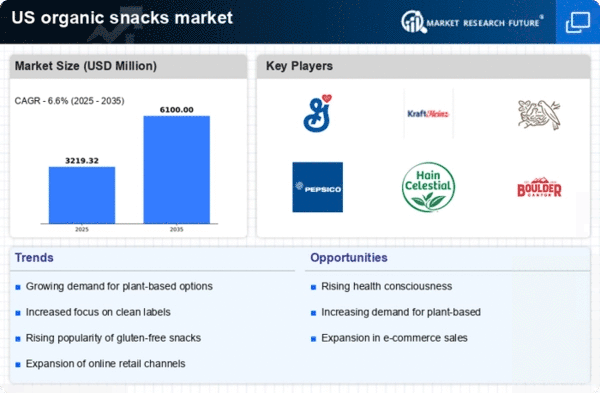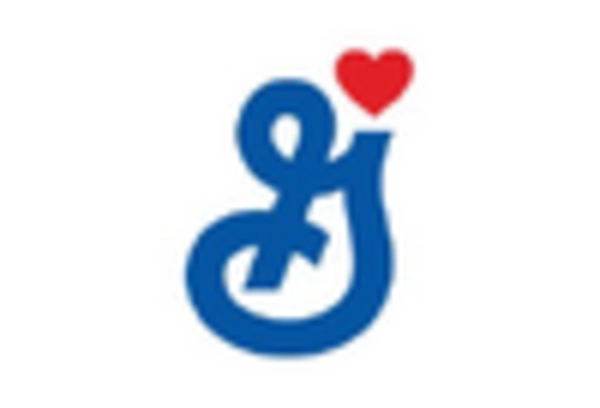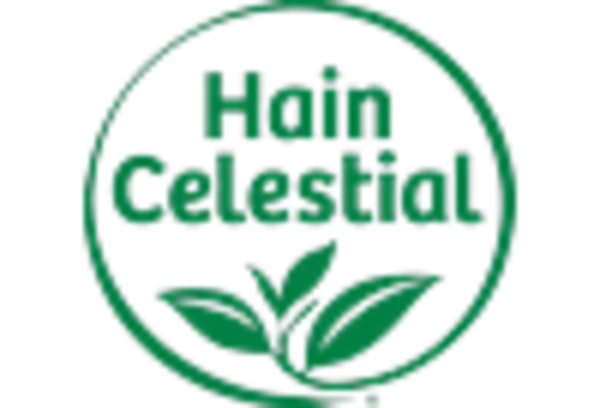Expansion of Distribution Channels
The organic snacks market is benefiting from the expansion of distribution channels, which enhances accessibility for consumers. Retailers are increasingly dedicating shelf space to organic products, and e-commerce platforms are facilitating online purchases. This trend is particularly relevant in the US, where online grocery shopping has surged. Data suggests that online sales of organic snacks have increased by 25% in the past year alone. As more consumers turn to digital platforms for their shopping needs, brands are adapting their strategies to ensure their products are readily available across various channels, thereby driving growth in the organic snacks market.
Increased Focus on Nutritional Value
The organic snacks market is witnessing a heightened emphasis on nutritional value, as consumers become more informed about the health benefits of their food choices. Many individuals are actively seeking snacks that offer functional benefits, such as high protein, low sugar, and added vitamins. This trend is reflected in the growing popularity of snacks fortified with superfoods, which appeal to health-conscious consumers. Market data indicates that the segment of organic snacks with enhanced nutritional profiles is projected to grow by 15% annually. As a result, manufacturers are reformulating existing products and developing new offerings to cater to this demand, thereby shaping the landscape of the organic snacks market.
Growing Interest in Plant-Based Diets
The organic snacks market is influenced by the rising interest in plant-based diets, as more consumers adopt vegetarian and vegan lifestyles. This shift is driven by health considerations, environmental concerns, and ethical beliefs. Research indicates that nearly 30% of US consumers are actively reducing their meat consumption, leading to a surge in demand for plant-based snacks. Consequently, brands are innovating to create organic snacks that align with these dietary preferences, such as chickpea chips and nut-based bars. This trend not only expands the product offerings within the organic snacks market but also attracts a broader consumer base.
Rising Demand for Clean Label Products
The organic snacks market is experiencing a notable increase in demand for clean label products, which are perceived as healthier and more transparent. Consumers are increasingly scrutinizing ingredient lists, seeking snacks that are free from artificial additives and preservatives. This trend is particularly pronounced among millennials and Gen Z, who prioritize health and wellness. According to recent data, approximately 70% of consumers in the US are willing to pay a premium for snacks that are labeled as organic or natural. This shift towards clean labels is driving innovation within the organic snacks market, as brands strive to meet consumer expectations for transparency and quality.
Influence of Social Media and Marketing
The organic snacks market is significantly impacted by the influence of social media and targeted marketing strategies. Brands are leveraging platforms like Instagram and TikTok to engage with consumers, showcasing their products through visually appealing content. This approach resonates particularly well with younger demographics, who are more likely to discover new snacks through social media channels. Data shows that brands utilizing influencer partnerships have seen a 20% increase in sales. As social media continues to shape consumer preferences, the organic snacks market is adapting its marketing strategies to capitalize on these trends, fostering brand loyalty and driving sales.

















